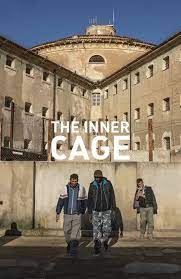
ARIAFERMA/ THE INNER CAGE
Italy, 2021, 117 minutes, Colour.
Toni Servillo, Silvio Orlando, Fabrizio Ferracane, Salvatore Striano, Roberto De Francesco, Pietro Giuliano, Nicolá Sechi.
Directed by Leonardo di Costanzo.
This is an unusual prison film, focusing not on a large prison population but rather a remnant in an old decaying building waiting transfer.
The setting is Sardinia, some graphic black and white/grey vistas of the vast mountains and valleys. But, the focus is on the prison, a large facility now decaying, overviews, abandoned corridors, exercise yard, overgrown gardens, and the central section, a Rotunda where 12 prisoners, a remnant, with six guards, are awaiting transfer.
The audience is introduced to the guards, duck hunting, good friendship, the camp, the fire – and then returning to find that they are not being transferred but have to remain with the last prisoners. The senior guard, Gaetano, played by one of the pillars of Italian cinema, Toni Servillo, giving yet another superior performance, is in charge. He is a man of integrity. He is a man of the letter of the law and strict interpretation. In charge, his men are loyal to him, obedient, although a close friend is particularly critical, spurning the prisoners.
We also see the range of prisoners, 12, an old man with dementia, a paedophile, a bigot against Muslims and Gypsies, a range of ages, a black prisoner, Muslim prisoner, and the youngest, from foster homes, arrested for mugging and brutal beating of an old man while stealing his wallet. The 12 men adapt to the change of situation although ready to revolt, especially refusing to eat the meals brought in from outside caterers. They have exercised time in the yard. Some are friendly. The prisoner who is obviously superior to the others is Lagioia, played by another veteran of Italian cinema, Silvio Orlando.
Gaetano has many elements of humanity but abides by regulations. However, given the strange situation of the men altogether, prisoners in prison, guards in prison, so to speak, he makes some concessions, especially with permitting Lagioia to act as cook. He is able to get the prisoners through their remaining days, especially during a storm and power failure where he allows the men to come out of their cells for the meal, bring all the cell tables together, sit together enjoying a meal, the joy of inviting the guards to sit and share the meal with them. It highlights the possibilities with some common humanity, not denying justice, but discovering some kind of compassion even though Gaetano firmly tells Lagioia that they have nothing in common.
The film gives the opportunity to look at prison systems, overcrowding, treatment of prisoners, but also highlights issues of responsibility, humanity, justice, difficult decision-making.
- Title? Prison? Prisoners and guards? Mutual imprisonment? Inner strengths?
- The setting, the vistas of the mountains of Sardinia, black-and-white, grey photography? The prison, vastness, overview, corridors, yards, gardens, the Rotunda, the guards’ quarters, the men’s cells? The musical score, the chant?
- The situation of the prison, the prison and its physical collapse, the director, the orders, moving most of the prisoners, the remaining 12, the guards to remain? The uncertainty of the final date for moving?
- The introduction to the guards, hunting, camping, duck hunting, chatter, friendship? Their being called to the director, the new orders?
- Gaetano, in charge, age, experience, manner, the rules, justice, treatment of the men, of the prisoners? The personal scenes in his room? Interaction with his men, the different points of view? Discipline, supervision, the issue of the hunger strike, rejecting the meals? Lagioia and his offer to cook, accepting this, supervising him in the kitchen?
- Fantacini, the youngest, serving the meals, the story of his being in foster care, the attack on the old man, stealing the wallet, brutalising him, the news of his being in coma, the lawyer coming to see him, the future trial, the heavier sentence if the man dies? His helping with the cooking, awkward, talking with Lagioia, Lagioia reassuring him, in his cell? Gaetano and his treatment of fettuccine?
- The range of men, age, backgrounds, race, Islam, the bigoted prisoner and his continued attacks, against Gypsies? His eating his meals alone? His later criticism of arts are no, paedophile, not eating with him? The black prisoner, chosen to share the cell with Fantacini and stop him from self-harm? Alexander, the old man, memory loss, pretending or not, exercise alone, the meals, finally coming out, sitting with the others? The bigot and his condemnation, that he would not change?
- The joy, the success of the meals, the response of the men? The critical officer, condemnatory of the men, not wanting to eat their meals?
- The deliveries late, Gaetano and Lagioia going out into the garden, collecting the herbs and vegetables, the discussions about their background, the joy and his father, the indicating that the Lagi family used the Gaetano fathere with their dairy suppliers?
- Fantacini, the lawyer, his news, in the cell, his being brought back, against the regulations?
- The blackout, the generator not being able to be restored, the opening of the meal, the limited lights, bringing out the tables from the cells, putting them together, the men eating their meal together, the invitation for the guards to sit, Gaetano, the bottle of wine, the talk, friendship, bonding?
- Gaetano, the issue of humanity, discussion with Lagioia, Gaetano saying they had nothing in common?
- The lights coming on, everything back to normal, the men in their cells, checking out the names?
- The consequences for the prisons, the guards, the Gaetano, and the possibilities for the men to be transferred?